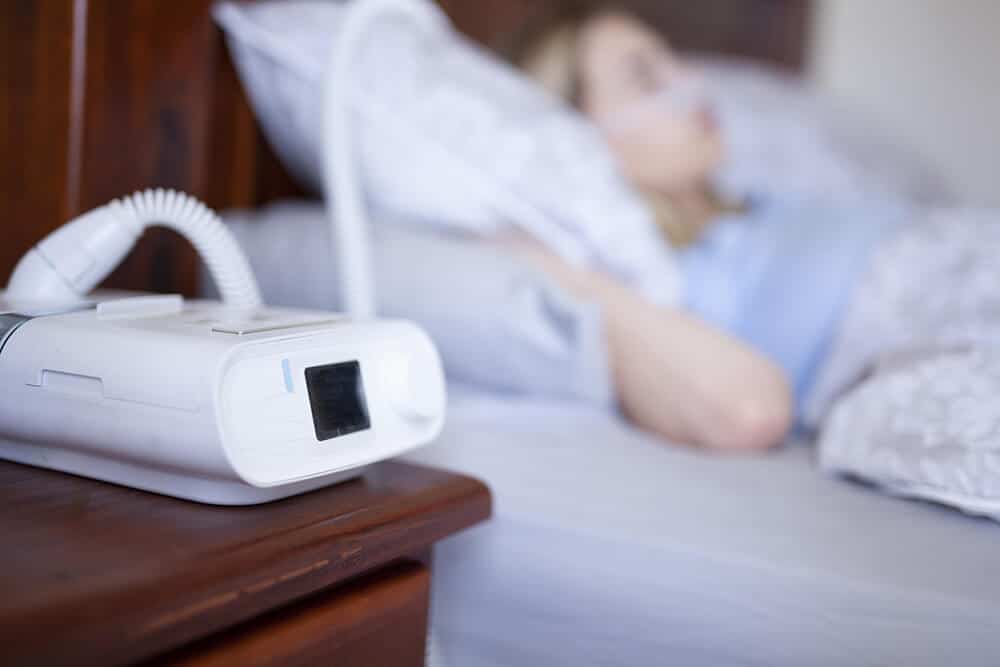
CPAPs and BiPAPs are great devices that can help you breathe more effectively throughout the night. These devices are classified as ventilators, but they don’t provide the function that you typically think of ventilators providing. They’re not used for life support, but rather to ensure the patient’s airflow is going to the right place.
These devices aren’t tubes in a person’s throat, they’re a ventilator with an attached mask that is worn, usually at night, that helps the patient breathe properly. The key difference between a CPAP and a BiPAP is that a CPAP is pressurized on the breath in, and then loses pressure on the breath out, whereas a BiPAP stays pressurized on both the breath in and the breath out.
If you use either of these types of devices to sleep better at night, you should be aware that there are major recalls currently happening with these devices.
CPAP and BiPAP Devices That Are Recalled
If you use Philips Respironics CPAPs or BiPAPs, you can see if your specific device is recalled here. You likely use these devices if you have Obstructive Sleep Apnea (OSA) or Chronic Obstructive Pulmonary Disease (COPD), which are both diseases that affect your breathing. Doctors can also recommend the use of these ventilators for other short-term illnesses, but these two diseases are typically the most common reason patients use these devices.
Philips controls over 60 percent of the market for these medical devices, which is why this recall is so important. The reason that these Philips Respironics CPAPs and BiPAPs are being recalled is that the foam used in them to reduce the sound and seal the airway can break down and enter the airway, which can then be inhaled by the user and enter their body. This foam is polyester-based polyurethane, which can cause cancer when inhaled.
As if the danger of inhaling potentially cancer-causing wasn’t enough of a hazard, there’s another reason that these breathing devices have been recalled. There are toxic gasses being emitted that are dangerous for users to inhale. These gasses escape because the foam mentioned above degrades over time.
The two gasses that have been found are Dimethyl Diazene and Phenol, 2,6-bis, which is also known as carbolic acid. When the gasses are emitted, patients are inhaling amounts that are higher than what’s determined to be safe. This means that their bodies could be harmed from how much of these toxic gasses they’re unknowingly inhaling.
How Do These Problems Affect the Body?
If you were using these devices, you might be wondering what damages they could be causing to your body if they’re defective. If you inhale the foam, it either gets encapsulated in your lungs, or it degrades further and the chemicals within it enter your blood stream. If it’s encapsulated, the effects would be similar to mesothelioma. If it enters your bloodstream, it could spread throughout your entire body.
As for the toxic gasses that could reach the body, they can cause different damage. If Dimethyl Diazene enters the body, it can cause harm to the liver and kidneys. It can even lead to organ failure or cancer in these organs.
While Phenol can sometimes be beneficial, in this instance, it is likely harmful. Phenol gas can cause burns on the patient’s skin and serious damage to the lungs. A patient might develop a new or worsening respiratory disease, or they might have a sudden respiratory event or failure from inhaling the gas. Additionally, the gas could cause them to have heart failure.
If you have used either of these devices, it’s important to seek medical treatment immediately. Even if you don’t think your device had any of these problems, you might not even know. That’s why you should go get evaluated by a medical professional. They’ll be able to screen you to see if you were affected by these defects and treat you right away.
If you receive VA benefits and own one of these devices or have received your BiPAP or CPAP home ventilator at a VA facility, it’s important to note that this recall affects devices made prior to April 26th, 2021. VA has distributed around 300,000 of these devices to Veterans. If you think you may have one of these devices, it’s important to contact the VA as quickly as possible to receive a replacement device. You can learn more here.



















